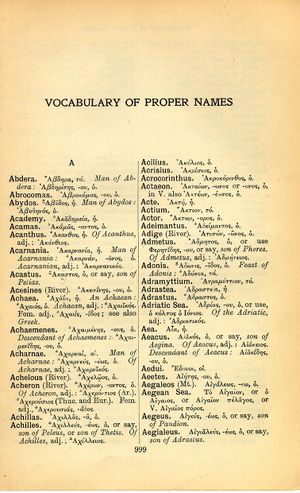Acastus: Difference between revisions
From LSJ
Εἷς ἐστι δοῦλος οἰκίας ὁ δεσπότης → Unus familiae servus ipse adeo est herus → Nur einen Sklaven gibt's allein im Haus, den Herrn
(Names) |
(6_1) |
||
| Line 1: | Line 1: | ||
{{WoodhouseENELnames | {{WoodhouseENELnames | ||
|Text=[[File:woodhouse_999.jpg|thumb|link={{filepath:woodhouse_999.jpg}}]]Ἄκαστος, ὁ, or <b class="b2">say, son of Pelias.</b> | |Text=[[File:woodhouse_999.jpg|thumb|link={{filepath:woodhouse_999.jpg}}]]Ἄκαστος, ὁ, or <b class="b2">say, son of Pelias.</b> | ||
}} | |||
{{Lewis | |||
|lshtext=<b>Ăcastus</b>: i, m., = Ἄκαστος.<br /><b>I</b> Son of [[Pelias]], [[king]] of [[Thessaly]], [[husband]] of Astydamia or Cretheis, and [[father]] of [[Laodamia]], Ov. M. 8, 306; 11, 410 al.—<br /><b>II</b> The [[name]] of one of [[Cicero]]'s slaves, Cic. Att. 7, 1 al. | |||
}} | }} | ||

